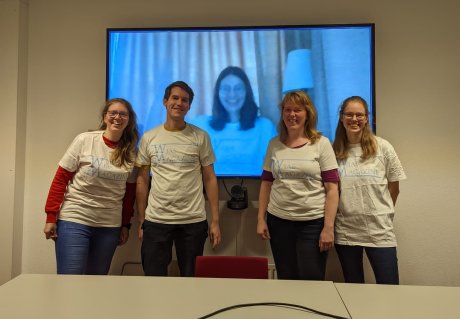
Everyone communicates, so everyone knows how to do it, right?
WIAS Magazine - Fall edition 2022
Lifestyle
For a long time, I thought science communication meant giving interviews for TV shows or writing articles for the newspaper. So I basically thought, this is something I will get to do when I am a senior researcher, and even then, I get to do it only when I work on something super interesting, like rocket science. It took a global pandemic and fake news spreading almost as quickly to make me realize that science communication is so much more than being in the news as an expert and presenting new exciting discoveries. Talking to my family and friends about their worries and candid questions seeking to make sense of the whole COVID-19 situation, I realized that science communication is, most importantly, the foundation for society's trust in science. I have seen it as my duty as a scientist to engage in science communication ever since. And once I decided I wanted to do it, I also wanted to know how to do it.
Starting to explore the world of science communication, I quickly noticed that there are so many different ways how to communicate science, and I wanted to learn more about them. By founding the Science Communication Interest Group in February 2021, Marieke Reijneker and I aimed to create a space for personal exchange about SciComm within WUR. By inviting expert speakers and offering everyone the chance to share their personal experiences with SciComm in the monthly group meetings, we chose to facilitate learning about SciComm in a fun, interactive setting with little time effort.
Luckily, this initiative was received very positively, and we can now look back on over a year of meetings covering various SciComm topics. While I would like to encourage you to check out the MSTeams channel as a great resource, I don't want to reiterate all the topics we've covered. Instead, I would like to share the lessons I learned from those meetings and how they influenced my perception of science communication.
The key learning that was repeated a lot was: knowing your audience. Knowing your audience helps you to choose the suitable medium or format to communicate your message. And there are a lot of different formats, from face-to-face dialogue over tweets, articles, and interviews to podcasts and YouTube videos. Each of those mediums has its target audience, and the way to communicate differs from plain text to pictures or videos. So, there is a variety to choose from, and there is no right or wrong way to do it. But your format choice should be informed by knowing how to reach your intended target audience most effectively.
It was surprising to me, and I think also to the rest of the group, to see how many different ways exist to do SciComm. We explored many of the formats in our meetings together with speakers with experience in the various formats. We listened to stories about career paths that led to doing SciComm full-time and heard about what kind of SciComm jobs there are. This made me realize that communicating science and developing new strategies to communicate science to different audiences is a whole universe of career perspectives.
After the formal introduction of the topics to the group, in each meeting, the discussion was full of questions like: How can I do this with my research? What would you advise someone that wants to try this format? Can I apply this format to my project? All questions indicated the participants' motivation to engage in those SciComm formats by themselves. To me, this demonstrated that we as scientists want to create an impact with our research, we want people to know about it, and we are willing to learn how to do SciComm properly.
With these thoughts in mind, I would like to take the chance to thank everyone that joined the meetings in the past. Your active participation brought this platform to life and helped build a knowledge base about SciComm at WUR. I hope that the SciCommIG will continue to be a cross-disciplinary platform to explore the different facets of SciComm and to inspire and encourage each other to implement SciComm in our life as students and researchers at Wageningen University and research.






